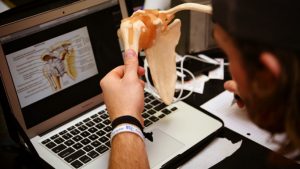This story was written for WRAL TechWire Innovator partner Gig East.
In this increasingly digital age, jobs are now integrated in ways that change industries and, as a by-product, careers.
For college students testing the waters of a liberal arts education, this means that careers they dreamed of as children may look very different by the time they graduate. Other students may find themselves graduating just a few years from now to work at a job that does not yet exist.
Colleges must anticipate this digital integration and information crossover, and help students develop the skills necessary for their futures — futures that will undoubtedly be directed by technology. Barton College, a small, independent liberal arts college in Wilson is doing just that for students, thanks in large part to the high-speed gigabit Internet available through Greenlight.
Greenlight technology is a world-class, city-owned fiber-optic network that provides residents, businesses, and students in Wilson with access to high-speed gigabit Internet that’s the fastest in the entire state.
With a long-term spot on the board of the Wilson Downtown Development Corporation, Barton College has added a voice to the city’s revitalization efforts, ensuring integration between the college and the business community, as well as the civic and religious communities.
Provost and Vice President of Academic Affairs at Barton, Gary Daynes, elaborated on the importance of Greenlight in this joint effort and the opportunities it has provided students and the municipality alike.
“Having access to gigabit Internet allows us to think really creatively about what student learning would look like here at Barton,” Daynes explained. “Colleges and universities have been constrained by the size of the pipe … how much access they have to the Internet. We actually have the great opportunity to experiment now with those sorts of things.”
As Daynes knows well, many of his students will be employed in Wilson during and after their time at Barton. To grow in the community and to be productive, successful members of society, Daynes said students must learn how to use ever-evolving technology for good.
“If they can learn here how to use technology for a good end, then they’re going to take that back to their communities — places that aren’t Wilson — and they’re going to be examples [of] how to not be used by technology, but instead about how to use technology for good,” Daynes continued.
But how do you teach “technology for good?”
It starts with a simple (yet, only sometimes achieved) concept: access. This is where the City of Wilson, and by extension Barton College, become game changers.
With Wilson’s commitment to gigabit technology and the resulting revolutionary Internet speeds throughout the city, Barton has a few key selling points.
For starters, access to high-speed Internet makes Wilson as a desirable city not only for residents and students, but for businesses, entrepreneurs and innovators, non-profits, and arts organizations. Secondly, consistent Internet access with fast download speeds allows for more creativity, both in developing curriculum and consuming it. For example, in Barton’s nursing program, students placed in clinical programs throughout the region have easy access to faculty members and resources — all of which are now electronic — so they can share information and use it as-needed during their externships.
Electronic resources provide several benefits. In addition to being accessible whenever and wherever students need the information — whether on laptops, tablets or mobile phones — the resources can also be updated consistently, thereby giving students the most up-to-date information possible. And, of course, a cost-effective e-version of a textbook can be much more desirable than the average $80 brick of a book that has to be lugged around campus.

A student utilizes technology in the Barton College School of Allied Health and Sport Studies. (Photo Courtesy of Barton College)
“Having my textbooks downloaded to my computer made it much easier to pull up my books during lecture and study on the go. I did not have to haul around an armful of textbooks, I could easily grab my laptop and head out the door,” shared Barton nursing student Kameron House. House is a recently hired nurse at UNC REX Heart and Vascular Hospital.
“Having the gigabit access on campus allowed us to take our nursing tests online, use our laptops during class to take notes, and work on any projects and papers from anywhere on campus. This made life so much easier. Being able to test on the computer allowed us to prepare for the NCLEX, which is a computer-based test and allowed our instructors to return our grades sooner,” House continued. “In nursing school, test anxiety doesn’t go away until we see those grades. Having great internet access was [also] wonderful on nice days. Barton’s campus is beautiful; being able to get out of the classroom and work on an assignment in the middle of campus was always relaxing.”
Nursing, pre-med and physical therapy students also use cadavers not only for practice but for studying the intricacies of human anatomy on a regular basis. With high-speed Internet access and simulation software, those creepy nights alone in the basement cadaver lab are not as mandatory as they once were for these students.
“Having access to the simulation mannequins in the lab, my textbooks digitally and the nursing computer lab was extremely helpful throughout my Barton experience,” House explained. “Our simulation mannequin, ‘Bart’ as we call him, can be controlled by an instructor in real time to manipulate things such as heart rate, heart rhythm and lung sounds to build our assessment skills. We, as students, can also practice intravenous catheter placement on ‘Bart’ to help us get over those first-time IV placement jitters.”
“Barton College consistently strives to provide a rich and engaging experience for our students,” added Douglas Searcy, president of Barton College. “By strengthening broadband access across campus with Greenlight, we are connecting our students and their ideas with people and places around the world. Interactive classrooms, digital images and videos, and teleconferencing are just a few examples of the ways in which we are elevating our service to students and increasing their engagement opportunities through education.”
These opportunities have helped Barton and its students develop a significant competitive advantage; one that will filter down within the greater Wilson community and throughout the region as Barton students graduate to become business and civic leaders.
By allowing students to learn and understand technology at a fundamental level, Barton is fulfilling its mission to train students to be bold thinkers and to be examples to their future co-workers, families and leaders. Learning with access to gigabit technology has plenty of practical benefits, but perhaps more importantly, it has moral and civic benefits as well.
This story was written for WRAL TechWire Innovator partner Gig East.

Recent Comments